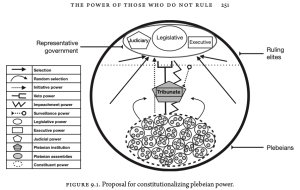Collective law-making process
Global view of process
Citizen panel, in presence
- Oregon
- Massaschussets
- Eupen (Belgium)
- Sion/Sitten
- Methodology
- 20-50 citizens randomly selected with municipality from an official electors list
- 2000 letters of invitation sent, 200 positive answers, random selection of 20 participants using a software to ensure representativity (age, political view, sex, income level) + 20 reserve (180 left)
- 2 x 2 days
- 500.– fees reimbursed
- Support: facilitators, technique (microphones, ...), copies (proposals documentation, ...) legal experts (terminologies, ...), catering, ...
Liquid democracy, online
- selection of 2000 citizens
- give access to a platform where they can make proposals and vote
- list of important topics selected by a public authority
- then a citizen panel is organized for each topic
Plebean republic
"This new political infrastructure for the common people needs to allow for the exercise of a constituent power able to create laws and institutions aimed at liberty, as well as to punish those who, by engaging in political corruption, have betrayed the republic."
"excluding those who have the ability to formally exert power over others and unduly influence the creation of law and policy—for example, public officials and their staff, lobbyists, judges, military commanders, and religious leaders— would establish a strictly political division between those who rule and those who do not. "
"Luxemburg’s insights on the need for the self-emancipation of the workers through political action, and Arendt’s argument for a space in which individuals can engage in action and new beginnings as a necessary condition for political liberty"
"Following Condorcet’s radical inclusiveness, every adult residing for one year in a particular district would be eligible to attend and vote"
"If each assembly has in average six hundred active members (Condorcet recommends between 450 and 900) this would mean that there would be several assemblies even in small towns, which would enable assemblies to ef- fectively channel diversity even within specific communities, allowing for a more engaged, less polarized citizenry, especially in regions divided across ethnic and religious lines"
Key rules
- The Plebeian Branch is to be composed of two basic institutions:
- A decentralized network of local assemblies of residents (see section II).
- A Tribunate—an office aimed at enforcing motions approved by the network of assemblies, and at fighting political corruption.
- The total aggregation of local assemblies is the sovereign subject of the republic; a decision reached in the majority of assemblies is the legitimate will of the people, and all branches of government must yield to it and properly enforce it.
- The Plebeian Branch is to be funded by a national tax collected for the sole and direct purpose of funding all the costs associated with the operations of local assemblies and Tribunate offices, and their appropriate exercise of constitutional powers.
- All branches of government—Executive, Legislative, and Judicial— are to obey decisions reached by the Plebeian Branch.
Legislative theater
Participatory theater for people to create laws[1] → video
- the joker asks: if you had the ability to create a law, what would it be?
- a scene of oppression is played (theater-forum)
- the audience writes down proposals which are passed on to a metabolic cell composed of an activist, a parliamentarian and a lawyer specialised in the theme
- the metabolic cell synthesises the notes and describes the laws that already exist, and makes 3-4 proposals for amendments or new laws
- at the end of the stage, the metabolic cell presents its results to the audience
- the audience debates the results and votes
- the metabolic cell transmits the voted proposal to a parliamentary group
HOC
Analysis
- legal paradigms
- benefit of random selection → get people that would usually not contribute
Dissemination
- ↑ Boal A. Legislative Theatre. Using performance to make politics. Routledge 1999. https://www.routledge.com/Legislative-Theatre-Using-Performance-to-Make-Politics/Boal/p/book/9780415182416
